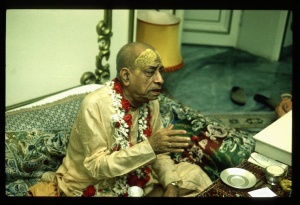CC Antya 4.127 (1975): Difference between revisions
(Vanibot #0027: CCMirror - Mirror CC's 1996 edition to form a basis for 1975) |
(Vanibot #0020: VersionCompareLinker - added a link to the Version Compare feature) |
||
| Line 2: | Line 2: | ||
<div style="float:left">'''[[Sri Caitanya-caritamrta (1975)|Śrī Caitanya-caritāmṛta (1975)]] - [[CC Antya (1975)|Antya-līlā]] - [[CC Antya 4 (1975)|Chapter 4: Sanātana Gosvāmī Visits the Lord at Jagannātha Purī]]'''</div> | <div style="float:left">'''[[Sri Caitanya-caritamrta (1975)|Śrī Caitanya-caritāmṛta (1975)]] - [[CC Antya (1975)|Antya-līlā]] - [[CC Antya 4 (1975)|Chapter 4: Sanātana Gosvāmī Visits the Lord at Jagannātha Purī]]'''</div> | ||
<div style="float:right">[[File:Go-previous.png|link=CC Antya 4.126 (1975)|Antya-līlā 4.126]] '''[[CC Antya 4.126 (1975)|Antya-līlā 4.126]] - [[CC Antya 4.128 (1975)|Antya-līlā 4.128]]''' [[File:Go-next.png|link=CC Antya 4.128 (1975)|Antya-līlā 4.128]]</div> | <div style="float:right">[[File:Go-previous.png|link=CC Antya 4.126 (1975)|Antya-līlā 4.126]] '''[[CC Antya 4.126 (1975)|Antya-līlā 4.126]] - [[CC Antya 4.128 (1975)|Antya-līlā 4.128]]''' [[File:Go-next.png|link=CC Antya 4.128 (1975)|Antya-līlā 4.128]]</div> | ||
{{CompareVersions|CC|Antya 4.127|CC 1975|CC 1996}} | |||
{{RandomImage}} | {{RandomImage}} | ||
==== TEXT 127 ==== | ==== TEXT 127 ==== | ||
| Line 11: | Line 10: | ||
<div class="verse"> | <div class="verse"> | ||
:sevaka gatāgati kare, nāhi avasara | :sevaka gatāgati kare, nāhi avasara | ||
:tāra sparśa haile, sarva-nāśa habe | :tāra sparśa haile, sarva-nāśa habe mora" | ||
</div> | </div> | ||
| Line 25: | Line 24: | ||
<div class="translation"> | <div class="translation"> | ||
"The servants are always coming and going without interval. If I touch them, I shall be ruined." | |||
</div> | </div> | ||
| Line 32: | Line 31: | ||
<div class="purport"> | <div class="purport"> | ||
Herein it is very clearly indicated that priests performing Deity worship should be careful to keep themselves completely pure and not be touched by outsiders. Sanātana Gosvāmī and Haridāsa Ṭhākura, thinking themselves mlecchas and yavanas because of their past association with | Herein it is very clearly indicated that priests performing Deity worship should be careful to keep themselves completely pure and not be touched by outsiders. Sanātana Gosvāmī and Haridāsa Ṭhākura, thinking themselves mlecchas and yavanas because of their past association with Mohammedans, did not enter the temple nor even travel on the path in front of the temple gate. It is customary for the priests of temples in India not even to touch outsiders nor enter the Deity room after having been touched. This is a very important item in temple worship. | ||
</div> | </div> | ||
Latest revision as of 01:45, 27 January 2020

A.C. Bhaktivedanta Swami Prabhupada
TEXT 127
- sevaka gatāgati kare, nāhi avasara
- tāra sparśa haile, sarva-nāśa habe mora"
SYNONYMS
sevaka—servants; gatāgati kare—come and go; nāhi avasara—there is no interval; tāra sparśa haile—if I touch them; sarva-nāśa habe mora—I shall be ruined.
TRANSLATION
"The servants are always coming and going without interval. If I touch them, I shall be ruined."
PURPORT
Herein it is very clearly indicated that priests performing Deity worship should be careful to keep themselves completely pure and not be touched by outsiders. Sanātana Gosvāmī and Haridāsa Ṭhākura, thinking themselves mlecchas and yavanas because of their past association with Mohammedans, did not enter the temple nor even travel on the path in front of the temple gate. It is customary for the priests of temples in India not even to touch outsiders nor enter the Deity room after having been touched. This is a very important item in temple worship.